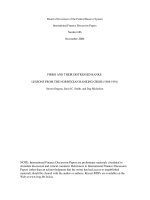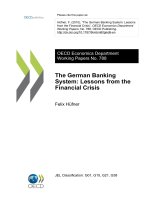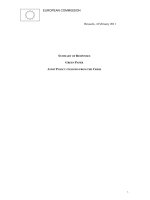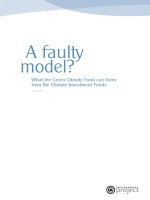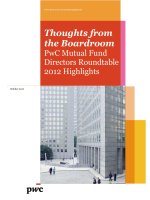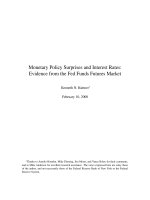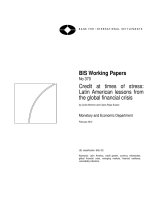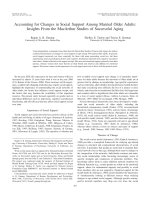baker - false profits; recovering from the bubble economy (2010)
Bạn đang xem bản rút gọn của tài liệu. Xem và tải ngay bản đầy đủ của tài liệu tại đây (1.05 MB, 184 trang )
False Profi ts
This page intentionally left blank
False
Profi ts
Recovering from the
Bubble Economy
Dean Baker
Copyright © by Dean Baker
All rights reserved. No part of this publication may be reproduced, distrib-
uted, or transmitted in any form or by any means, including photocopy-
ing, recording, or other electronic or mechanical methods, without the prior
written permission of the publisher, except in the case of brief quotations
embodied in critical reviews and certain other noncommercial uses per-
mitted by copyright law. For permission requests, write to the publisher,
addressed “Attention: Permissions Coordinator,” at the address below.
Berrett-Koehler Publishers, Inc.
Montgomery Street, Suite , San Francisco, CA -
Tel: () - Fax: () - www.bkconnection.com
O R D E R I N G I N F O R M A T I O N
Quantity sales. Special discounts are available on quantity purchases
by corporations, associations, and others. For details, contact the “Spe-
cial Sales Department” at the Berrett-Koehler address above.
Individual sales. Berrett-Koehler publications are available through most
bookstores. ey can also be ordered directly from Berrett-Koehler:
Tel: () -; Fax: () -; www.bkconnection.com
Orders for college textbook/course adoption use. Please con-
tact Berrett-Koehler: Tel: () -; Fax: () -.
Orders by U.S. trade bookstores and wholesalers. Please contact
Ingram Publisher Services, Tel: () -; Fax: () -;
E-mail: ; or visit www.
ingrampublisherservices.com/Ordering for details about electronic ordering.
Berrett-Koehler and the BK logo are registered
trademarks of Berrett-Koehler Publishers, Inc.
First Edition
Paperback Print eidtion, ISBN ---- (alk. paper)
PDF e-book ISBN ----
IDPF e-book ISBN ----
Mobi e-book ISBN ----
-
Production management: BookMatters
Book and Cover design: George Mattingly, BookMatters
Contents
Acknowledgments vii
Introduction
1 Economic Collapse: It Is eir Fault
2 Surveying the Damage
3 e Terrible Tale of the
TARP
4 Will ey Ever Discover
the Housing Bubble?
5 Stimulus: It Is Just Spending
6 Real Stimulus: Progressive Programs
to Boost the Economy
7 Reforming the Financial System
8 Remember the Housing Bubble!
Notes
Index
About the Author
Figures
. Net Wealth of Late Baby Boomers
. Net Wealth of Early Baby Boomers
. Percent of Homeowners Needing
Cash to Sell eir Houses
. Homeownership Rates
. Loss in Annual Demand and
Net Stimulus
vii
Acknowledgments
I wrote this book as a response to the pervasive e orts to
rewrite the facts and history surrounding the worst economic
downturn in years. I appreciate the support of PoliPoint-
Press, and in particular Peter Richardson and Scott Jordon.
e work has bene ted from considerable feedback from my
friends and colleagues, including Eileen Appelbaum, Alan
Barber, Heather Boushey, Helene Jorgensen, Danilo Pelletiere,
Hye Jin Rho, David Rosnick, John Schmitt, Mark Weisbrot,
and Nicole Woo. I also owe thanks to the never-ending
patience of Helene, Kiwi, and Walnut.
This page intentionally left blank
1
Introduction
As the nation struggles to recover from the worst economic
downturn since the Great Depression, the people who got us
here are desperately working to rewrite history. e basic story
of this economic collapse is very simple. e Federal Reserve
Board, guided by its revered chairman, Alan Green span,
allowed an trillion housing bubble to grow unchecked.
Arguably, the Fed even fostered the bubble’s growth, see-
ing it as the only source of dynamism in an economy that was
su ering from the a ershocks of the collapse of a trillion
stock bubble. Greenspan repeatedly insisted that the housing
market was just ne, even as a small group of economists
and analysts raised concerns about the unprecedented run-up
in house prices. He also dismissed concerns about the ques-
tionable mortgages the banks were issuing on a massive scale
during the bubble years. In fact, he even encouraged people
to take out adjustable-rate mortgages (ARMs) at a time when
xed-rate mortgages were near a -year low.
As explained in chapter , the devastating consequences
for the economy of the collapse of the housing bubble were
2 FALSE PROFITS
inevitable. Housing wealth, unlike stock wealth, is relatively
evenly distributed among the population. For the vast major-
ity of middle-class families, home equity is their nancial
asset. When the collapse of the bubble resulted in the disap-
pearance of trillion of housing bubble wealth (, per
homeowner on average), tens of millions of homeowners had
no choice but to sharply curtail their consumption.
e wealth that homeowners had taken for granted during
the bubble years was gone. is meant that these homeown-
ers could no longer borrow against home equity to support
their level of consumption and that they would need to hugely
increase their savings to rebuild the wealth they had lost. e
rapid fallo in consumption, coupled with the collapse of
housing construction, guaranteed the onset of a severe reces-
sion. ere is no simple way to o set the loss of more than
trillion in annual demand in the economy
— billion in
lost housing construction and between billion and
billion in lost consumption.
A massive wave of foreclosures and mortgage-loan
defaults are also an inevitable parts of this story. Millions of
people would have lost their homes even without the tsunami
of junk loans the banks issued during the bubble years. When
house prices plunge below the value of the mortgage, home-
owners have less means and incentive to struggle to meet their
payments. e huge job loss from the recession also propelled
the massive wave of foreclosures.
None of this is complicated or mysterious. Anticipat-
ing this disaster didn’t require brilliant insights or complex
INTRODUCTION 3
models. In fact, a good student in an introductory economics
course would have possessed all the knowledge needed to see
this train wreck coming.
However, the political elites do not want the o cial story
to be that simple. ey don’t want the public to know that the
people holding the top economic policy positions are incom-
petent, corrupt, or both. By burying the story in complexity,
these elites are trying to confuse the American public.
e confusion begins when the media and the politi-
cians routinely refer to the recession as a “ nancial crisis.”
e implication is that the nancial system is at the root of
the problem and that xing the nancial system is the way to
restore the economy to its normal growth path. Although the
failings of nancial regulation certainly allowed the bubble
to grow much larger than otherwise would have been pos-
sible, and the troubles in the nancial system have aggravated
the downturn, the current economic situation would be little
changed if the nancial system were instantly restored to per-
fect health.
e core problem is that the economy developed serious
imbalances as a result of the growth of the housing bubble.
In the short term, the only way to o set the loss of demand
caused by the collapse of the housing bubble is through mas-
sive de cit spending. In the longer term, a reduction in the
value of the dollar will be necessary to restore more balance to
our U.S. trade. However, the political elites, led by the manag-
ers of the nancial industry, do not want to allow for a discus-
sion that results in a policy prescription of large de cits and
4 FALSE PROFITS
a lower valued dollar. Such policies would go directly against
their nancial interests and directly indict the policy agenda
they have promoted for more than a decade.
Rather than let people see the simple story, the political
elites are anxiously touting the complexity of the situation.
ey want to focus the debate on complex derivative instru-
ments like “credit default swaps” (CDSs) or “collaterized debt
obligations” (CDOs). In this way they hope to quickly confuse,
and lose, the public. ey can then assert that the problems
were so complicated no one could be blamed for not having
foreseen them. A er all, we’re only human, and no one can
predict the future.
e foregoing is the main motive for writing this book. It
is a follow-up to my book explaining the origins of the bubble:
Plunder and Blunder: e Rise and Fall of the Bubble Economy
(PoliPointPress, ). e elites should not be allowed to per-
petuate the falsehood that it was not their fault. eir failure
to recognize the housing bubble or to have taken the steps
necessary to rein it in before it grew to such dangerous levels
brooks no excuse. Tens of millions of people have lost jobs, life
savings, or homes because of this incredible failure on the part
of the country’s top economic policymakers. e people who
are responsible for this disaster should be held accountable for
the damage they have wreaked on the nation and the world.
In fact, the best way to prevent another bubble would be
to re the people responsible, but such a measure is highly
unlikely. e list is long of people who should have known
INTRODUCTION 5
better and could have taken steps to counter the bubble before
it grew to such dangerous proportions. Ben Bernanke, the
chairman of the Federal Reserve Board during the last phase
of the bubble, would top that list.
Bernanke was one of the seven members of the Fed’s
Board of Governors from until June . In this capac-
ity, he could have challenged Alan Greenspan’s decision to
allow the bubble to grow unchecked. Bernanke subsequently
became head of President Bush’s Council of Economic Advi-
sors, where he served for seven months before returning to
the Fed as chairman in January of . e entire time from
he sat back and allowed the bubble to grow. He never
took any steps to rein it in, nor did he issue any warnings to
the public about the potential consequences of its collapse.
It would be di cult to imagine someone with a compa-
rable record of disastrous failures being allowed to remain
in most jobs. Would a nurse who routinely administers the
wrong medicine and causes his patients to die be allowed to
keep his job? Would a bank teller who leaves the cash drawer
open remain in her position? How about the school bus driver
who comes to work drunk?
In most lines of work, a certain level of competence is
expected. Unfortunately, this is not the case for those who set
U.S. economic policy. In political circles, the idea that Ben
Bernanke should lose his job because he didn’t take action to
counter the bubble is considered absurd.
Bernanke was not, by any means, the only one who should
6 FALSE PROFITS
have been trying to counter the bubble. Considering the dire
consequences of the bubble’s collapse, this was the most
important thing anyone in a policy position should have been
doing. Washington is chock full of people working on eco-
nomic policy in positions at the Treasury, the Fed, the various
regulatory agencies, and elsewhere who earn six- gure sala-
ries. ey all failed to see or issue warnings about the housing
bubble. Not one of these people has gotten red. In fact, not a
single person involved in economic policy has probably even
missed a promotion because of this gross failing.
is view
—
that the collapse of the housing bubble caused
the economic collapse and subsequent recession
—
is com-
pletely di erent from the commonly discussed view that the
abundance of bad mortgages was the main problem. Bad
mortgages fed the bubble and allowed it to reach much more
dangerous proportions. e core problem, however, was the
bubble itself, not the mortgages. If all the mortgages had met
normal prudential standards, but we had a bubble of the same
proportions, the economy would still be in pretty much the
same situation as it is today.
Conversely, if we had the same ood of bad mortgages
and no bubble, the consequences would have been more lim-
ited, even for the homeowners who took out these mortgages.
In many cases, they would have been able to re nance into
standard xed-rate mortgages. Even if re nancing had been
impossible because of a bad credit or employment situation,
homeowners might have been able to sell their homes and
pocket some equity, rather than being forced into foreclosure.
INTRODUCTION 7
In order to assign correct blame and to design proper
reforms, it is essential to distinguish between the bubble as the
primary cause of the crisis and the bad mortgages themselves.
Although the ood of bad mortgages was evident to those who
cared to look, an trillion housing bubble should have been
impossible to miss for any serious economic analyst. e point
is that we do not need supersleuth regulators and analysts to
uncover similar problems before those problems crash the
economy, but we do need policymakers who are smart enough
to walk and chew gum at the same time.
Creating new agencies is not the answer; forcing the agen-
cies that are responsible for maintaining economic and nan-
cial stability ( rst and foremost the Federal Reserve Board)
to do their job properly is. e Fed could have and should
have stopped the growth of the housing bubble long before
it reached such enormous proportions. Its failure to do so
was perhaps the single most consequential error in economic
policy in the history of the world.
o
Going forward, the Federal Reserve Board must clearly be
responsible for preventing asset bubbles — such as the stock-
market bubble and the housing bubble
—
from posing a threat
to the economy. Contrary to assertions from former Federal
Reserve Board Chairman Alan Greenspan, recognizing such
bubbles is not only possible but it is precisely what the Fed is
supposed to do. And, once it recognizes a bubble, the Fed has
all the power it needs to de ate it.
8 FALSE PROFITS
Many other changes should result from this experience.
Most importantly, the country needs to rein in a nancial
sector that has grown out of control, nearly quadrupling its
share of the economy over the last three decades. is sector
accounted for almost percent of all corporate pro ts at the
peak of the housing bubble.
Ideally, the nancial sector funnels money from people
who want to save it to those who want to borrow it to start
or expand a business or to pay for a home or a college educa-
tion. irty years ago, this country’s nancial sector accom-
plished this mission very well, and the economy had a much
more rapid pace of productivity growth than in the last three
decades.
A nancial sector brought back down to size will carry
out its economic function much more e ciently. e United
States doesn’t need a nancial sector that prospers through
the creation and trading of complex nancial instruments
of little economic value. A reduction in the size of this sector
would also make it less powerful and prevent it from exerting
political control over those who are supposed to regulate it.
Part of the problem is that the sector’s control over regula-
tors is actually built into the system. e Fed is structured so
that the private-sector banks dominate the boards that control
the Fed district banks that comprise the Federal Reserve
System, along with the Board of Governors located in Wash-
ington DC. ese boards then select the Fed district bank
presidents. ese bank presidents sit on the Fed’s Open
Market Committee, which determines interest-rate policy,
INTRODUCTION 9
outnumbering the Fed governors who are appointed by the
President and approved by Congress. (Only of the bank
presidents vote at any one time.) is arrangement is akin to
the pharmaceutical industry picking members of the Food
and Drug Administration (FDA). Congress must democratize
the Fed by rewriting its charter.
o
As we push for reform, it is important to avoid framing the
debate
— as conservatives routinely do and progressives fool-
ishly accept
—
as a con ict between those who want more
government control versus those who want market control.
Despite what they say to sell their policies to the public, con-
servatives have never been interested in reducing the role of
government and “leaving things to the market.” In reality,
they want the government to structure the market to facilitate
the redistribution of income upward.
Progressives do the conservatives’ bidding when we denounce
them as “market fundamentalists.” We should, instead, be expos-
ing their use of government to set up structures that ensure the
market works to bene t the wealthy. We could then bring our
policies into focus as those designed to ensure that market out-
comes will bene t the bulk of the population.
e market is just a tool, like a wheel or a hammer. It
would be bad politics and bad policy for progressives to make
a big scene attacking the wheel. It is similarly bad politics and
bad policy to put these attacks on the market at the center of
a political agenda.
This page intentionally left blank
11
S
ONE
Economic Collapse:
It Is Their Fault
Imagine if the economy were managed by people who did
not know basic arithmetic, the stu that we all learned in
third grade. Imagine further that as a result of their inability
to understand simple arithmetic, huge economic imbalances
grew to ever more dangerous levels.
If this happened, surely the business and economics
reporters would be on the job, pointing out the ungodly
incompetence of the country’s top economic o cials and the
risks that their ignorance posed for us all. Undoubtedly, thou-
sands of economists, all quite skilled at mathematics, would
be pointing out the errors. Members of Congress, especially
those sitting on the committees that have major economic
responsibilities, would be organizing hearings to call attention
to the mismanagement of the economy.
12 FALSE PROFITS
If the media, the economics profession, and Congress
somehow failed to move quickly enough, and disaster struck,
certainly those most responsible for this calamity would lose
their jobs and su er public humiliation. Lengthy news stories
would denounce problems in our system of governance that
allowed for extraordinary incompetence at the highest levels.
Not in America.
e basic story of the economic crisis is that the top
economic leaders acted as though they were ignorant of
third-grade arithmetic. e fact is, they are not
—
these are
intelligent people
—
but they ignored enormous imbalances
in the U.S. economy that could have been easily detected
with nothing more than a third-grade education and com-
mon sense. Speci cally, they ignored the growth of a housing
bubble that eventually expanded to more than trillion. ey
also ignored the inevitability that this bubble would collapse
and devastate the economy.
One can speculate about the reasons our economic leaders
ignored this massive threat to the well-being of the economy
and the country as a whole. For a while, everything seemed
ne, as long as the growth of the bubble expanded the econ-
omy and created jobs. In addition, politically well-connected
people in the nancial sector were making enormous for-
tunes. ose responsible for managing the economy had real
incentives to ignore a looming crisis, even if it was completely
apparent to them.
Where were the business and economic reporters? ey
generally show extraordinary deference to the Federal Reserve
ECONOMIC COLLAPSE: IT IS THEIR FAULT 13
Board (Fed) chairman, the Treasury secretary, and other top
economic o cials. In fact, in the late s, a prominent
Washington Post reporter wrote a glowing account of Alan
Greenspan’s management of the economy titled “Maestro.”
Few reporters are con dent enough about their own analytic
abilities to directly confront top o cials and suggest that they
are fundamentally mismanaging the economy. A er all, the
Fed chairman, Treasury secretary, and the rest are very smart
people; otherwise they would not hold these positions.
What about the thousands of independent economists?
Surely they would have su cient con dence in their analytic
abilities to raise the alarm. Simple economic analysis suggests
that they are unlikely to speak up against a consensus in the
profession. But even a con dent and smart economist cannot
be certain that she is right. A er all, we all make mistakes. If
Alan Greenspan says that black is white, he could be right.
Questioning the status quo becomes even more intimidat-
ing when everyone else seems to agree. When Alan Green-
span says no housing bubble exists, and all the other big-name
economists more or less concur, then maybe black is white. A
young economist seeking tenure, or even a more established
economist looking to move up the profession’s ranks, would
be taking a great risk by warning about the housing bubble.
e price of being wrong would be ridicule and the likely end
of any hopes of career advancement. Sticking with the main-
stream of the profession would be far safer.
e incentives for conformity created by the sociology
of the economics profession run deep. Robert Shiller, a Yale
14 FALSE PROFITS
economics professor and one of world’s preeminent nancial
economists, began warning of the housing bubble in .
However, even he noted how constrained he felt he needed to
be in his warnings.
Shiller didn’t want to be rude in pushing
his view, in spite of the fact that he knew that failure to contain
the bubble could lead to the sort of economic disaster that we
are now experiencing.
When those within the core of the profession are con-
strained from raising the alarm by the positions they hold,
the job is le to those at the margin. And those at the margin
are, by de nition, marginalized. So, if Alan Greenspan says
that everything is ne, the public should not be concerned if
a few economists at the margin of the profession are pointing
to the storm clouds on the horizon.
As far as the hope that our representatives in Congress
would raise the alarm
—
let’s just state the obvious: politicians
are rarely leaders. e most e ective politicians detect changes
in public sentiment and respond to them quickly. ey don’t
get out in front and warn the public of new problems that are
not yet widely recognized. Very few politicians
—
certainly
none in leadership positions
—
would challenge the consensus
within the economics profession.
e ignorance of those who should have known better was
abetted by the fortune that the nancial industry was making
o the housing bubble. Top executives in the industry were
o ering substantial rewards to their friends in academia and
politics who went along for the ride. e truth plus cents
may buy a cup of co ee, but most of those who could have
ECONOMIC COLLAPSE: IT IS THEIR FAULT 15
blown the whistle were looking for something more. e top
executives of Citigroup, Lehman Brothers, Bear Stearns, and
other nancial institutions central in providing the nancing
that propped up the bubble had no interest in bringing the
party to an early end.
What about a er the fact? Once the bubble burst and the
damage had been done, we would expect the people who failed
at their jobs to be held accountable. Maybe somewhere, but
not in this country. e basic story is that the people who
failed to warn of the housing bubble are the people in charge
of repairing the damage.
e people reporting on nance today are for the most
part the same people who ignored the bubble in the years
–
. ey have little interest in admitting how easy
it was to both recognize the bubble and predict the resulting
damage from its collapse. e economists who either didn’t
see the bubble, or didn’t want to stick their necks out by dis-
cussing it, are the same ones charting the economic path going
forward. ey don’t want to call attention to the di culties
they seemed to have with third-grade arithmetic. And the
politicians are still listening to the bankers, who still have lots
of money for campaign contributions.
So, instead of inquests and exposes, we get cover-ups.
Almost all discussions about how we failed to see catastrophe
coming focus on the nancial aspects of the crisis, many of
which are complicated, and ignore the fundamental cause: the
huge overvaluation of the country’s housing stock. Once the
topic moves from bubble-in ated house prices to credit default
16 FALSE PROFITS
swaps and collateralized debt obligations, nearly everyone
following the news is safely lost.
In this nancial crisis story, the crisis is talked about as if
it were a rare and highly unlikely event
—
a black swan
—
rather
than one that could be predicted with absolute certainty, even
if the timing and exact course of events could not be known.
Instead of ring all the people who didn’t do their jobs, Wash-
ington’s policy elite has instead focused on creating a new
agency — a “systemic risk regulator” — responsible for detect-
ing such “unlikely” events in the future.
e “systemic risk regulator” is the ultimate joke on the
country. We already have a systemic risk regulator. It’s called
the Federal Reserve Board. At many points it has staged
extraordinary interventions whenever it felt that events in the
nancial sector were spinning out of control and threatening
to seriously harm the economy. Alan Greenspan’s e orts to
shore up the stock market a er the crash and his inter-
vention in the unraveling of the Long-Term Capital Hedge
Fund in provide the two most obvious examples.
e problem was not that we lacked a systemic risk regula-
tor but rather that we had one that failed catastrophically at its
job. Rather than holding our failed regulators accountable, we
are pretending that their job descriptions were the problem.
is response is akin to creating a new government agency
to rescue people from burning buildings a er an especially
deadly re. e more obvious solution is to dump the head of
the re department.
e assumption would be that if people died in burning
